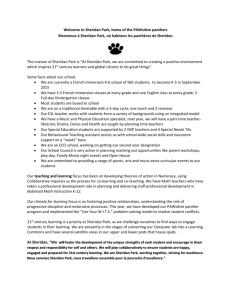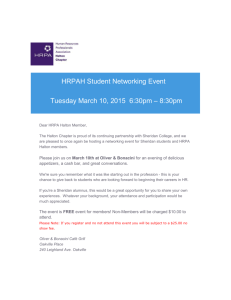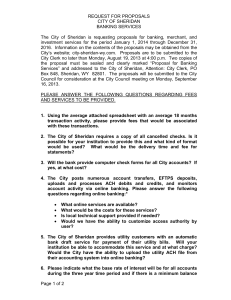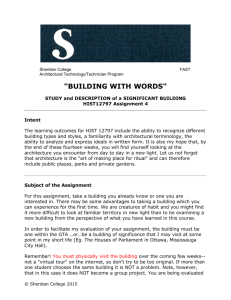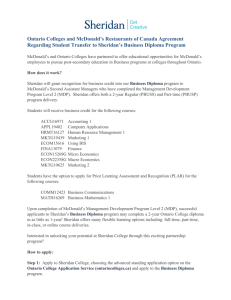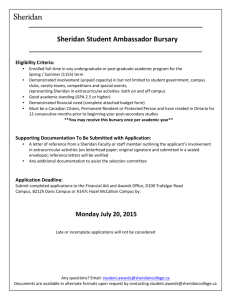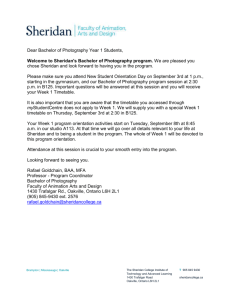Academic Integrity Policy Date of Approval
advertisement
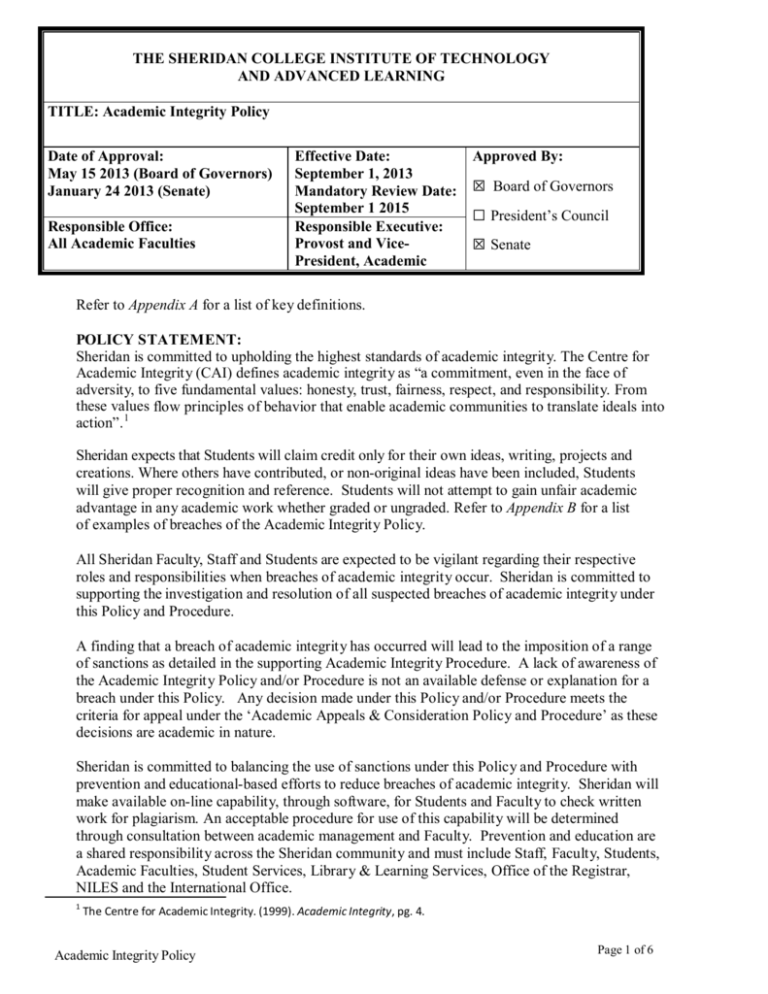
THE SHERIDAN COLLEGE INSTITUTE OF TECHNOLOGY AND ADVANCED LEARNING TITLE: Academic Integrity Policy Date of Approval: May 15 2013 (Board of Governors) January 24 2013 (Senate) Responsible Office: All Academic Faculties Effective Date: September 1, 2013 Mandatory Review Date: September 1 2015 Responsible Executive: Provost and VicePresident, Academic Approved By: ☒ Board of Governors ☐ President’s Council ☒ Senate Refer to Appendix A for a list of key definitions. POLICY STATEMENT: Sheridan is committed to upholding the highest standards of academic integrity. The Centre for Academic Integrity (CAI) defines academic integrity as “a commitment, even in the face of adversity, to five fundamental values: honesty, trust, fairness, respect, and responsibility. From these values flow principles of behavior that enable academic communities to translate ideals into action”. 1 Sheridan expects that Students will claim credit only for their own ideas, writing, projects and creations. Where others have contributed, or non-original ideas have been included, Students will give proper recognition and reference. Students will not attempt to gain unfair academic advantage in any academic work whether graded or ungraded. Refer to Appendix B for a list of examples of breaches of the Academic Integrity Policy. All Sheridan Faculty, Staff and Students are expected to be vigilant regarding their respective roles and responsibilities when breaches of academic integrity occur. Sheridan is committed to supporting the investigation and resolution of all suspected breaches of academic integrity under this Policy and Procedure. A finding that a breach of academic integrity has occurred will lead to the imposition of a range of sanctions as detailed in the supporting Academic Integrity Procedure. A lack of awareness of the Academic Integrity Policy and/or Procedure is not an available defense or explanation for a breach under this Policy. Any decision made under this Policy and/or Procedure meets the criteria for appeal under the ‘Academic Appeals & Consideration Policy and Procedure’ as these decisions are academic in nature. Sheridan is committed to balancing the use of sanctions under this Policy and Procedure with prevention and educational-based efforts to reduce breaches of academic integrity. Sheridan will make available on-line capability, through software, for Students and Faculty to check written work for plagiarism. An acceptable procedure for use of this capability will be determined through consultation between academic management and Faculty. Prevention and education are a shared responsibility across the Sheridan community and must include Staff, Faculty, Students, Academic Faculties, Student Services, Library & Learning Services, Office of the Registrar, NILES and the International Office. 1 The Centre for Academic Integrity. (1999). Academic Integrity, pg. 4. Academic Integrity Policy Page 1 of 6 PRINCIPLES: The Academic Integrity Policy and Procedure are an affirmation and clarification for all members of the Sheridan community of their respective obligation(s) to maintain the highest standards of academic integrity. The principles of this Policy include: a) promoting an environment of academic integrity that values honesty, trust, fairness, respect, and responsibility; b) upholding the academic excellence of Sheridan including its programs and curriculum; c) protecting the integrity of Sheridan credentials that help Students and graduates achieve success in their fields of practice; and d) ensuring that grades for all Students provide an accurate assessment of their work. SCOPE: All members of the Sheridan community including Faculty, Staff and Students are required to follow the Academic Integrity Policy and Procedure in the event that there is a suspected breach of academic integrity by a Student. The steps, including sanctions, outlined in the Academic Integrity Procedure apply only to Students. INFORMATION& COMMUNICATION: Students, Faculty and Staff are informed about Sheridan policies and procedures in a number of ways. By the time a policy is adopted, it has been reviewed and approved by internal operational committees and governance bodies many of which include representation by Students and Faculty. Faculty and Staff receive an internal communications bulletin, the Sheridan Insider, which highlights new or significant changes to existing policies and procedures. As a part of the admissions process, Students are required to acknowledge that they have read all of Sheridan’s academic policies and procedures and agree to adhere to any new or amended policies and procedures. Changes to existing and new academic policies and procedures will be broadly communicated to the Students through various means and the Sheridan community is responsible for remaining up to date with all of Sheridan’s policies and procedures. Responsible Area(s): Academic Faculty / Office of the Registrar Contact / Support: Student Services Centre - askanadvisor@sheridancollege.ca Office of the Registrar - infosheridan@sheridaninstitute.ca RELATED PROCEDURE & FORM(S): 1. Academic Integrity Procedure 2. Breach of Academic Integrity Form Academic Integrity Policy Page 2 of 6 RELATED POLICIES/PROCEDURES: 1. Academic Appeals and Consideration Policy and Procedure 2. Admissions Policy and Procedure 3. Prior Learning Assessment and Recognition Policy and Procedure 4. Advanced Standing Policy Academic Integrity Policy Page 4 of 6 Appendix A – KEY DEFINITIONS Academic Faculty - the larger academic unit within which individual Faculty members teach. Faculty - all teaching members as covered under the Academic Employees Collective Agreement and those with part-time and sessional statuses. Sheridan - Sheridan College Institute of Technology and Advanced Learning. Staff - all employees of Sheridan College Institute of Technology and Advanced Learning who are not members of the Academic Bargaining Unit. Students - all current enrolled students at Sheridan. Appendix B – EXAMPLES OF BREACHES OF ACADEMIC INTEGRITY The following summary provides selected definitions and examples for specific behaviors that constitute breaches of academic integrity. These examples are intended to educate all parties as to what types of behaviours fall under this Policy and to provide some context in which to apply the current Policy and Procedure. This section is not meant to be a complete or comprehensive list of all possible breaches of academic integrity. Each particular situation should be assessed by the Faculty or manager applying the Policy and Procedure in light of specific facts in each scenario. Implications of Criminal Acts: It should be noted that some breaches of academic integrity may also involve criminal acts which are liable to criminal prosecution as well as academic sanctions by Sheridan, and such examples include theft and impersonation. Cheating is the attempt to gain an improper advantage on an academic evaluation. Forms of cheating include, but are not limited to: • • • • • • • • • • stealing, reproducing, circulating or otherwise gaining prior access to examination materials; copying another person’s answer to an examination question; consulting an unauthorized source (e.g., textbooks, website, cheat-sheet, another Student) during a test or examination unless specifically instructed to do so by the Faculty; communicating verbally, or otherwise, with another Student(s) during a test or examination, unless specifically instructed to do so by the Faculty member; obtaining assistance by means of electronic (e.g., cell phone, PDA, wireless technology) or other aids which are not approved by the Faculty member (Note: all electronic devices must be turned off and out of sight during exams or tests unless the Faculty member specifies otherwise); changing a grade or record of an examination result; submitting substantial portions of the same work to more than one course without consulting the Faculty members who teach the courses; submitting work prepared in whole or in part by another person and representing that work as one’s own; offering for sale or other benefit essays, drawings, portfolio elements, or any other academic work, in whole or in part, to other Students who may submit the work as their own; and/or preparing work, in whole or in part, with the expectation that this work may be submitted by another Student as their own work. Academic Integrity Policy Page 4 of 6 Impersonation is taking someone else’s place or having someone else take your place in class, in a test, examination or interview, presentation or field placement, when that situation involves academic evaluation. Plagiarism is the act of presenting another person’s words, research or ideas as your own without acknowledging the source of the information used. An individual can plagiarize by receiving “help” from another person or by merely copying what they tell you to do, say or write, without personally learning the content. Examples include: • • • • • • • copying, buying or obtaining in another way an essay, project, visual art piece, programming code, or other type of work and then submitting it as your own work. This includes buying a paper from a research service or a paper mill, or obtaining a paper written by a peer, relative, or friend and submitting it as your own. copying another person’s words without the use of quotation marks and appropriate references to signify that these are excerpts from someone else’s work; presenting another person’s ideas or theories in your own words without acknowledging that person; presenting someone else’s technical, programming, digital information, thinking or expertise as your own (e.g., architectural sketches, computer programs, or 3D models); submitting as your own the musical scores, dance routines, visual art pieces, sketches, drawings, photographs, etc. created by another artist; submitting work that has been altered by someone else (e.g., web sites) as your own. Obtaining feedback from others is encouraged as an important part of the learning process but it is very important that you get suggestions and then make necessary changes yourself. It is not appropriate for you to have someone modify or correct your work and then submit the work as your own; and/or not giving credit to a person with whom one has collaborated to create a product. All individuals who have contributed ideas or insights into the work produced should be acknowledged. Improper Research Practice: Academic research includes the collection, analysis, interpretation and publication of information or data obtained in the scientific laboratory or in the field. Forms of improper research practice include but are not limited to: • • • dishonest reporting of investigative results, either through fabrication or falsification; taking or using the research results of others without permission or due acknowledgement; and/or misrepresentation or selective reporting of research results or the methods used. Falsification or unauthorized modification of an Academic Document/Record: It is an act of academic dishonesty to falsify, fabricate or in any way modify, either through leaving out or changing an academic document or record. Examples of falsification include but are not limited to: • • • forging a document or the signature on a document such as a doctor’s note, letter of recommendation or letter of permission; falsifying information on an official document such as grade reports, drop/add form, ID card or other College document; and/or improper actions in the context or pursuing Advanced Standing or Prior Learning Assessment and Recognition may breach this Policy. Academic Integrity Policy Page 5 of 6 Obstruction of the Academic Activities of Another: It is a violation of academic integrity to interfere with the learning activities of another in order to gain unfair academic advantage. 2 Inappropriate Use of Digital Technology: Forms of inappropriate use of digital technology may include but are not limited to: Unauthorized entry into a computer file for the purpose of using, reading or changing its contents; • Unauthorized transfer of one or more files or part of the data contained within a file; • Unauthorized use of another’s identification and/or password; and/or • Use of computing facilities to interfere with, or alter the work of another Student, Faculty member, or Sheridan Staff member. • Aiding and Abetting: Encouraging, knowingly enabling or causing others to do, or attempt, any of the above with intent to mislead a Faculty, academic unit, program, office or committee as to a Student’s academic status, qualifications, actions or preparation shall be considered a breach of academic integrity. References: Note: Sheridan wishes to acknowledge York University and Mohawk College as sources for parts of this policy. 2 York University, Senate Policy, Academic Honesty, April 28, 2005.
